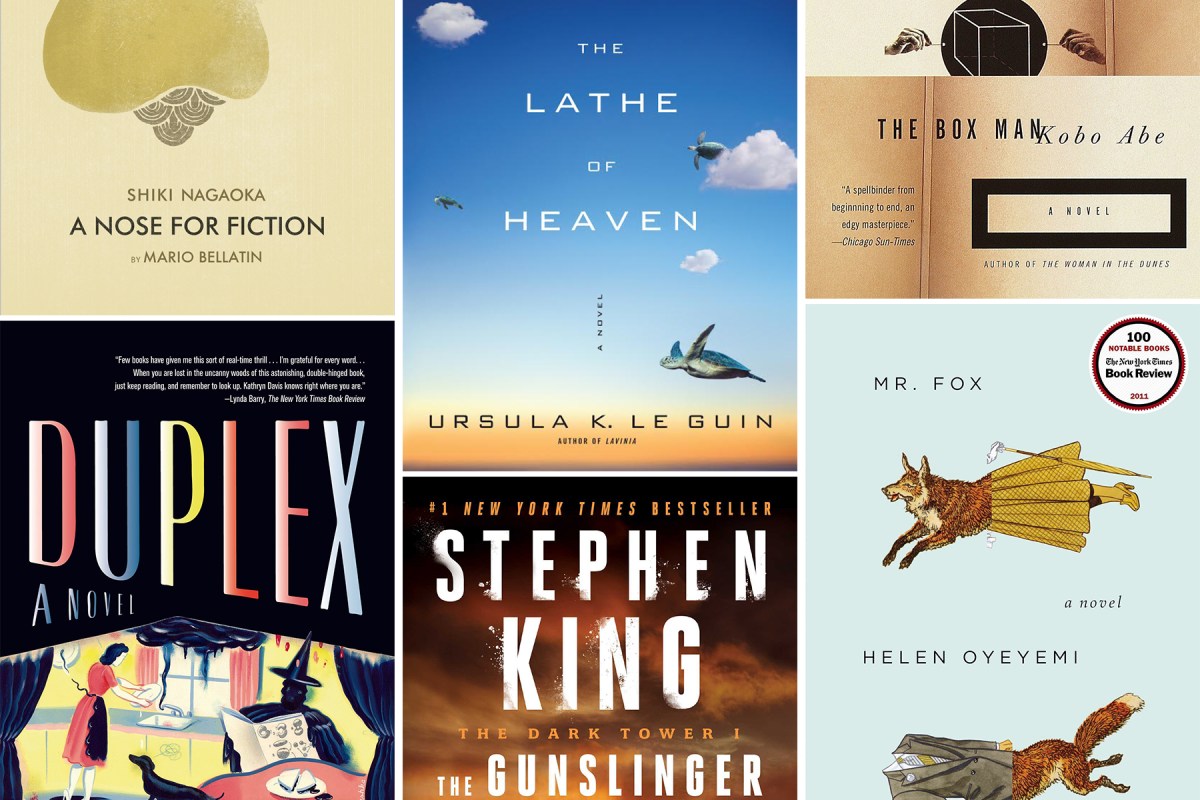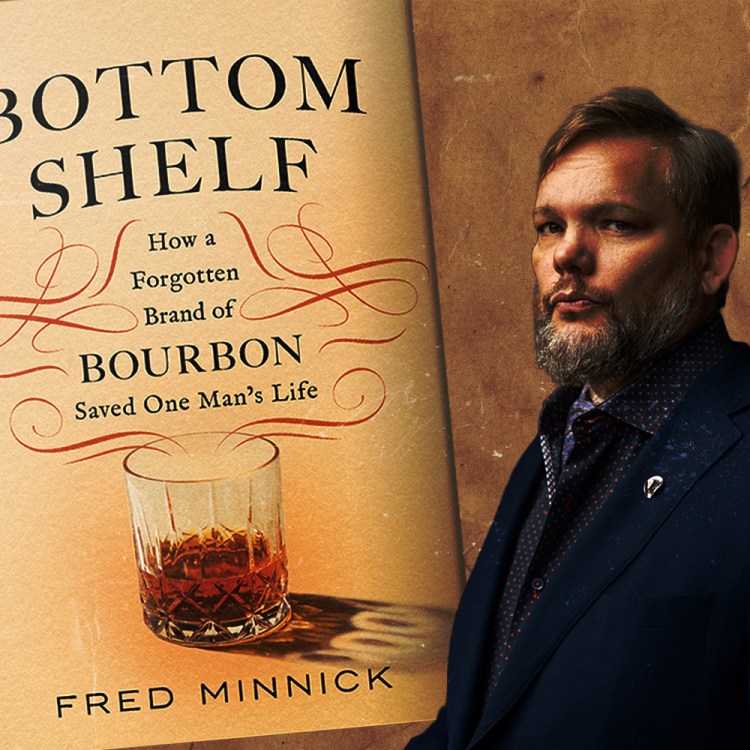Literature is serious business. We think of books as storing the ideas of civilization and teaching us about the truths that only fiction can tell. We talk about the “Great American Novel” that can sum up the spirit of a nation and debate which writers best captured the soul of mankind. And that’s all well and good. But fiction is also the realm of the imagination, and the imagination can think up some pretty strange things. Sometimes the most insane ideas produce the most interesting books. Here are ten amazing novels based on crazy ideas:
The Dark Tower series by Stephen King
Stephen King has a lot of wacky ideas. IT has an evil clown that’s actually a giant space spider, Christine is about a haunted car, and “The Moving Finger” features, well, a creepy finger in a sink. But my favorite of King’s crazy ideas is The Dark Tower series. These novels follow a “gunslinger” named Roland — basically a supernatural Clint Eastwood — trying to find a tower in a post-apocalyptic-Western-epic-fantasy setting. King basically throws every crazy idea he’s had into the mash-up world including a comedian vampire that feeds off laughter, a giant cyborg bear infested with worms, and a rampaging horde of robots that look like Dr. Doom and throw Harry Potter hand grenades. Oh yeah, and King himself appears in one book as a character who might hold the key to saving all existence. On paper, it sounds like a complete mess. But King somehow pulls all these disparate elements together into one of the best — if most insane — epic fantasy stories ever told.
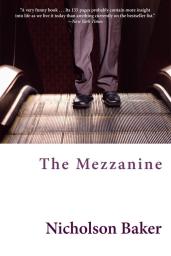
The Mezzanine by Nicholson Baker
Here’s the plot summary of Nicholson Baker’s debut novel The Mezzanine: a guy takes the escalator to the mezzanine. That’s it. Seinfeld may claim to be a show about nothing, yet it has nothing on The Mezzanine. While nothing at all happens in the novel, it is somehow about everything. Instead of a novel with traditional characters, conflict and a plot arc, The Mezzanine instead takes place almost entirely in the main character’s head as he muses about everything from shoelaces to popcorn. It’s a testament that a witty mind and insightful prose can spin gold out of even the oddest ideas.
Shiki Nagaoka: A Nose for Fiction by Mario Bellatin
Mexican novelist Mario Bellatin is as much a prankster as he is a fiction writer. His wild novels often have twisted conceits, but none of them is stranger than A Nose for Fiction. Apparently in real life when Bellatin was at a conference someone asked him about his influences and, annoyed by the question, Bellatin simply made up a name: Shiki Nagaoka, who he claimed was an obscure Japanese novelist with a nose so giant he needed help eating food. Later, Bellatin decided to write a biography of this snouty fictional Japanese author he’d made up on the spot. Only Bellatin could turn an inscrutable joke into an actual novel.
Duplex by Kathryn Davis
Duplex is a novel about your typical American suburb. Or, well, your typical American suburb that’s also filled with robots, flying boats and hot-wheeling sorcerers. Davis’s 2013 novel stitches a variety of different fantasy and science fiction tropes onto the body of a coming-of-age suburban novel to create a surreal Frankenstein of a story. It’s completely crazy, but unlike anything you’ve ever read.
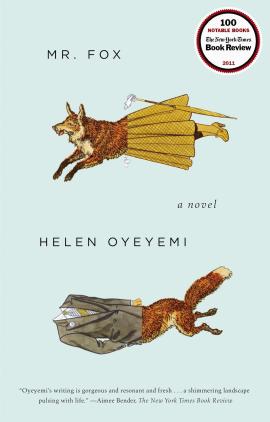
Mr. Fox by Helen Oyeyemi
Helen Oyeyemi is one of the most exciting fabulist authors writing today. Her novels like Gingerbread and Boy, Snow, Bird take fairy tales stories and rewrite them to tackle modern concerns. Mr. Fox has to have her strangest plots though: an author who always kills off his fictional heroines is sucked inside his own novels by his muse who considers him a literary serial killer. Inside his stories, Mr. Fox and his muse go on a series of terrifying adventures inspired by different incarnations of the classic Bluebeard fairy tale. They’re soon joined by Mrs. Fox who thinks her husband is having an affair with his fictional muse. It’s all metafictional and wacky, but also the kind of brilliantly inventive book that can only come from a bizarre idea.
The Box Man by Kobo Abe
Almost every one of the novels of Kobo Abe, “the Japanese Kafka” as he’s often called, are quite strange. In his brilliant debut, The Woman in the Dunes, a man get trapped in a village where every house is at the bottom of a sand pit and the villagers are forced to spend their entire lives shoveling. But The Box Man takes the weird idea cake. The novel tells the story of a man who decides to drop out of society and live inside of a giant cardboard box. This, somehow, becomes a thriller with a doctor and nurse trying to capture the box man and steal his cardboard box. Meanwhile, the novel itself is the notes written by various characters on the interior walls of the box itself.
Orlando by Virginia Woolf
Virginia Woolf is probably not the first name that comes to mind when you think of “insane ideas.” She’s one of the pillars of English-language modernism, helping to craft a new form of literary realism with writers like James Joyce. But Woolf is also the author of Orlando — a novel allegedly begun as a “joke” — about a nobleman who magically changes into a woman at age 30 and lives for centuries. Orlando’s adventures stretch from Elizabeth I to the 1920s, meeting famous figures from English history along the way.
A Void by Georges Perec
Georges Perec’s 1969 experimental novel sounds like the kind of idea one comes up with while very, very stoned: what if you wrote a novel without using the letter “e”? Perec — a member of the experimental writing group Oulipo — follows this constraint for a full 300 pages to make an utterly unique novel. Called La Disparition (“The Disappearance”) in French, the novel is always translated without using any words that contain the most common letter in that language’s alphabet. In English and French, that’s “e.” If you think that doesn’t sound that hard, try it! I’ve used the letter over 600 times in this short article.
The Lathe of Heaven by Ursula K. Le Guin
Science fiction has long mined crazy ideas to create memorable and usual novels. One of my favorites is The Lathe of Heaven, a novel about a man named George Orr who can change reality with his dreams. This means that the actual reality of the story changes constantly throughout the book. Plotwise, a scientist tries to control Orr’s dreams to create a utopia — but his attempts keep backfiring. It’s a trippy novel that nevertheless tackles serious themes like environmentalism, philosophy, and human happiness.
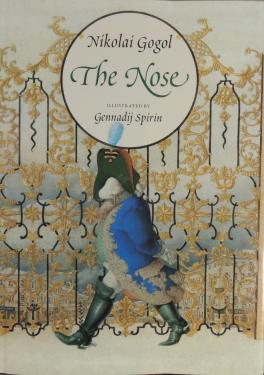
The Nose by Nikolai Gogol
Ah, 19th-century Russian literature, a bastion of serious, sweeping, realist literature like Dostoevsky’s Crime and Punishment and Tolstoy’s War and Peace that is beloved by English professors everywhere. Oh yeah, and also Nikolai Gogol’s The Nose about a nose that escapes (in a loaf of bread) from a dude’s face and then runs around St. Petersburg climbing the ladder of Russian society. The Nose is landmark literary satire of 19th century Russian society and its obsession with social rank and status. While more of a long short story than a novel, The Nose is proof that crazy but brilliant books have been with us for centuries. Its popularity also endures with writers. Philip Roth and Rivka Galchen have both created similar works of fiction using Gogol’s odd template.
This article appeared in an InsideHook newsletter. Sign up for free to get more on travel, wellness, style, drinking, and culture.
